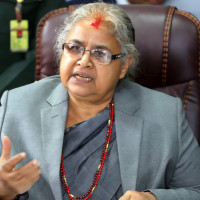- Thursday, 25 December 2025
Green Energy Transition
Climate change has become a fact of everyday life. The NASA recently confirmed that 2024 was the hottest year on record. Though the least developed or developing countries are disproportionately impacted by climate change, wealthy and developed countries are also said to be vulnerable, albeit to a lesser extent. But the devastatingly raging wildfires that broke out days ago in California, the most developed and prosperous state in the most powerful country of the world, the USA, has burned thousands of homes and structures to ashes, claimed a dozen of lives so far, rendered hundreds of thousands of people homeless, and displaced countless others, many of whom happen to be prominent Hollywood celebrities. Top climate scientists have unequivocally attributed the catastrophic wildfires to climate change.
Shell shocked and distressed, several of the victims cried that they never thought climate change would arrive at their doorsteps this soon. This is the latest in a series of evidence to suggest that the affluent too are hit hard. Mostly wealthy countries, that have been burning fossil fuels to sustain their luxury lifestyle, some of which include living in air-conditioned setting 24/7 and driving individually owned fossil fuel-powered vehicles. In several of such countries, cars are so ubiquitous that they outnumber the population there. It would be fair to say that it is mostly these people – who are relatively more impervious to the wrath of climate change – that the wildfires in question should jolt out of complacency first.
The solution to this crisis that has posed existential threat to humanity is simple: ditching fossil fuels in favour of renewable energy. But the world's addiction to them is so deeply entrenched that forsaking them at once has so far proven to be easier said than done. But that's not to say that no concrete efforts have been made to that end. The rise of electric vehicles (EVs) that have started taking over the road, remarkable acceleration of solar and wind powers, whose share of the energy mix has been on the swift rise globally owing to technological revolution and falling cost of generation, and phasing out of coal-powered power plants are some of the remarkable climate actions.
Nepal, despite contributing negligibly to the greenhouse gas emissions that causes global warming, is well aware of what should be done to make a dent on climate change. Political parties of Nepal and their leaders these days make it a point to speak about it. Ruling Nepali Congress looks to be in the lead on this front and we hope others will be following suit. Delivering a speech at a programme organised by the Environment and Climate Change Concern Division of the party on Friday, NC president and former prime minister Sher Bahadur Deuba said that the use of EVs as a means of mobility alone can go a long way to reduce the impact of climate change. He also highlighted the urgent need to strengthen and expand climate change advocacy.
The import of EVs into the country has started outnumbering those powered by fossil fuels, and, by 2030, eighty per cent of the new vehicles sold in the country is expected to be EVs, experts closely observing the trend say. This is indeed an encouraging news. Given the alarming level of air pollution and climate change impacts getting worse day by day, transition from fossil fuels to renewable and green energy is so urgent that it is more of an imperative than a choice.

















